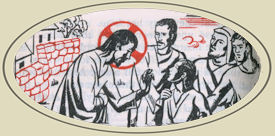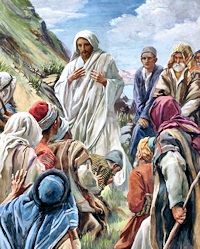» Enjoy our Liturgical Seasons series of e-books!
Jesus said to his disciples: “You have heard that it was said, An eye for an eye and a tooth for a tooth. But I say to you, offer no resistance to one who is evil. When someone strikes you on your right cheek, turn the other one as well. If anyone wants to go to law with you over your tunic, hand over your cloak as well.
Today is the feast of St. Polycarp which is superseded by the Sunday Liturgy.
Click here for commentary on the readings in the Extraordinary Form of the Roman Rite.
Sunday Readings
The first reading is taken from the Book of Leviticus 19:1-2. 17-18. Today, we hear one of the rules of conduct which are set out in chapter 19; that of love of neighbor. Other rules included reverence for parents, observance of the Sabbath, avoidance of idolatry, upon harvesting leaving some of the grain in the fields for the poor, and the practice of justice and charity in social dealings.
The second reading is from the first Letter of St. Paul to the Corinthians 3:16-23. As we work our way through the first part of 1st Corinthians, last week we heard Saint Paul tell of the true wisdom of God. This week he again addresses the divisions in the people of God and reminds the Corinthians (and us) who we really belong to.
The Gospel is taken from St. Matthew (5:38-48). The lesson we have to learn from today's gospel hardly needs any emphasizing. We must, if we are truly Christian, forgive those who offend or injure us. We must love all men, whether they be friends or enemies. G. K. Chesterton says : "We are commanded to love our neighbors and our enemies; they are generally the same people." This is very true for all of us. It is very easy for me to love (in a theoretical way) all Japanese, Chinese, Russians and most Europeans–they never come in contact with me and never tread on my corns. But it is my neighbors, those among whom I live and work, who are liable to injure me and thus become my enemies.
Charity begins at home, because it is here that it can and should be learned and practiced. It is first and foremost necessary for Christian peace in the home. Husband and wife must learn to understand and tolerate each other's imperfections and faults. If one offends in what the other would regard as something serious, the offended one should not demand an apology but should show forgiveness before the other has humbly to apologize. No two persons in the world, not even identical twins, can agree on all things, so it is vain and unrealistic to expect even one's married partner to agree with one in all points. Christian charity alone can cover the multitude of faults of both partners.
If there is peace and harmony between husband and wife, as there will be if both are truly charitable, the children will learn too to be understanding and forgiving. Such a home will be a truly happy home even if it has little of the world's riches.
Our charity must spread from the home to our neighbors–to all those with whom we have contact. It is easy to get on with most people, but in every neighborhood and in every village or town there will always be those who are difficult. There will be the dishonest, the tale-bearers, the quarrelsome, the critic of everyone and everything. It is when we have dealings with such people that all our Christian charity is necessary. Most likely we will never be able to change their ways of acting, but charity will enable us to tolerate their faults and will move us to pray for their eternal welfare.
Life for many, if not for most people, has many dark, gloomy and despairing moments. The man or woman who is moved by true Christian charity can bring a beam of sunshine, a ray of hope, into the lives of these people. Fr. Faber in a booklet on kindness has a poem which we could all learn and practice with great profit for ourselves and for a neighbor in need of kindness. He says:
"It was but a sunny smile,
And little it cost in the giving,
But it scattered the night like the morning light
And made the day worth living.
It was but a kindly word,
A word that was lightly spoken,
Yet not in vain for it chilled the pain
Of a heart that was nearly broken.
It was but a helping hand,
And it seemed of little availing,
But its clasp was warm, it saved from harm
A brother whose strength was failing."
Try the sunny smile of true love, the kindly word of Christian encouragement, the helping hand of true charity, and not only will you brighten the darkness and lighten the load of your brother but you will be imitating in your own small way the perfect Father of love who is in heaven.
—Excerpted from The Sunday Readings by Fr. Kevin O'Sullivan, O.F.M.
 Commentary on the Readings for Quinquagesima Sunday
Commentary on the Readings for Quinquagesima Sunday
Jesus said to him, "Receive thy sight, thy faith has saved thee" (Gospel).
"We are going up to Jerusalem," city of His Great Sacrifice, during Lent. His intimate followers were spiritually blind to the need of a Good Friday.
In this picture we even see them angrily trying to hold back one who wanted to see the need of Lenten penance–faith which lives by love: love for God, love for neighbor (Epistle). Where there is love, there is no labor; but if there is labor, it is loved. The Introit, Prayer and Gradual inspire us with confidence as we too, "go up" with faith (Offertory) and charity (Communion Verse).
—Excerpted from My Sunday Missal, Confraternity of the Precious Blood






